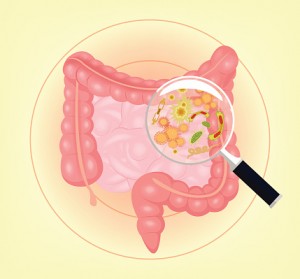Common E. coli infection affecting humans: Enteritis, UTI and kidney failure
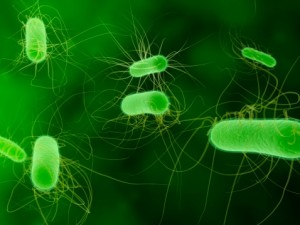 The E. coli infection is linked to the cause of hemolytic uremic syndrome (HUS), urinary tract infections (UTI), kidney failure, enteritis and diarrhea. E. coli, or Escherichia coli, is a bacteria that can live in the intestines of humans and animals. When ingested, E. coli is generally fairly harmless, only resulting in bouts of diarrhea. But sometimes E. coli can contribute to severe pain, bloody diarrhea and vomiting.
The E. coli infection is linked to the cause of hemolytic uremic syndrome (HUS), urinary tract infections (UTI), kidney failure, enteritis and diarrhea. E. coli, or Escherichia coli, is a bacteria that can live in the intestines of humans and animals. When ingested, E. coli is generally fairly harmless, only resulting in bouts of diarrhea. But sometimes E. coli can contribute to severe pain, bloody diarrhea and vomiting.
Generally healthy adults can bounce back from E. coli, but young children and seniors are at higher risk of developing complications associated with E. coli, such as kidney failure and hemolytic uremic syndrome.
By knowing how E. coli is caused you can prevent catching the bacteria and minimize your risk of the complications associated with it.
Causes of E. coli infections
E. coli comes in many strains, but the version that leads to abdominal discomfort and diarrhea is known as O157:H7. This group of E. coli produces toxins that damage the lining of your small intestine. The development of E. coli occurs when it is ingested.
Common areas for E. coli contamination, which can cause E. coli-related side effects include:
- Contaminated food: ground beef, unpasteurized milk, fresh produce exposed to runoff from cattle farms
- Contaminated water: human and animal feces can get into water sources, outbreaks have been linked to municipal water supplies, private wells can raise the risk of contaminated water
- Personal contact: passed person-to-person if infected person does not properly wash their hands
- Improper food handling: aside from the food products themselves, if preparation of food is not done properly it can cause the E. coli bacteria to grow.
- Poor hygiene: ensure you wash your hands, don’t reuse utensils from raw meat for other food items, cook food at its proper temperature
- Animals: outbreaks found in petting zoos, those who work with animals
E. coli infection and enteritis
Enteritis is the swelling and inflammation of the intestines – E. coli can cause enteritis. E. coli enteritis is caused the same way as other E. coli infections – through consumption of contaminated food, water, animals or person-to-person contact.
Symptoms of E. coli enteritis include: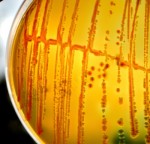
- Fever
- Intestinal gas
- Severe cramps
- Loss of appetite
- Nausea
- Vomiting
Dehydration can result from E. coli enteritis as a result of the diarrhea. As a treatment staying well hydrated is essential. If vomiting is preventing fluids from staying down, an intravenous may be required in a hospital.
Over the counter antidiarrheal medications are also useful to help reduce diarrhea, which can contribute to dehydration. But if blood is present in the diarrhea along with a fever, you should go to the hospital.
E. coli enteritis typically heals on its own, and some research suggests that the use of antibiotics doesn’t help speed up the recovery process.
Complications associated with E. coli enteritis are minimal, but in rare cases it can become quite severe and lead to hemolytic uremic syndrome, which can progress into anemia, kidney failure and death.
Proper hygiene and handling of food can prevent contracting E. coli and enteritis.
E. coli infection and urinary tract infection (UTI)
The urinary tract consists of the bladder, kidneys, ureters and urethra. When bacteria enter any part of the urinary tract it can result in infection. E. coli bacteria are responsible for nearly 85 percent of urinary tract infections.
Symptoms of a urinary tract infection include: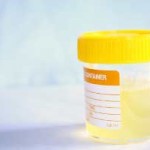
- Burning sensation when urinating
- Frequent urination
- Little amount of urine
- Fever or chills
- Foul-smelling urine, color change in urine
- Pelvic or rectal pain (depending on gender)
- Pain in the lower back, flank, abdomen, or hips
Typically a urinary tract infection is treated with antibiotics, as well as drinking plenty of fluids – including pure cranberry juice, not the sugary variety.
Women are more likely to experience a UTI due to having a shorter urethra compared to men. Additional risk factors of a UTI are:
- Kidney stones or other conditions which block the urinary tract
- Spinal cord injury or nerve damage
- A urinary catheter
- Weakened immune system
Although typically antibiotics are effective in treating UTIs, some E. coli strains are resistant to them. This resistant E. coli strain is known as extended-spectrum beta-lactamase (ESBL) and is causing more and more UTIs each year. The growth of this antibiotic-resistant strain of E. coli comes from the use of antibiotics in chickens to make them gain weight.
E. coli infection and kidney failure (Hemolytic uremic syndrome)
Hemolytic uremic syndrome (HUS) results from abnormal premature destruction of red blood cells. During this process damaged red blood cells clog the filtering system of the kidneys, which leads to life-threatening kidney failure. E. coli is a potential cause for hemolytic uremic syndrome.
Other causes of HUS include:
- The use of certain medications
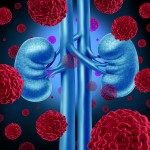
- Pregnancy
- Certain infections – HIV/AIDS
- Genetics
- Contaminated food and water
Symptoms of HUS are:
- Bloody diarrhea
- Vomiting
- Abdominal pain
- Pale skin tone
- Fatigue and irritability
- Fever
- Blood in urine
- Small, unexplained bruises
- Decreased urination
- Swelling of the body
- Confusion
Complications associated with HUS are:
- Sudden kidney failure
- High blood pressure
- Chronic kidney failure
- Heart problems
- Stroke
- Coma
Treatment of HUS involves:
- Fluid replacement
- Red blood cell transfusion
- Platelet transfusion
- Plasma exchange
- Kidney dialysis
How to prevent E. coli infections
To prevent complications associated with E. coli bacteria, it’s best to avoid contact with it. Because there is no vaccine against it, you must become more mindful of your surroundings and partake in healthy behaviors for better prevention.
Prevention tips to avoid E. coli infections include:
 Ensure meat is cooked at appropriate temperatures – for example, beef burgers should be cooked at 160 F (71 C).
Ensure meat is cooked at appropriate temperatures – for example, beef burgers should be cooked at 160 F (71 C).- Drink pasteurized milk, juice and cider.
- Wash raw produce thoroughly.
- Always wash utensils.
- Avoid using the same utensil for different food items.
- Store raw food at appropriate temperatures.
- Do not keep raw meat out on a counter or in the sun.
- Always wash your hands.
- Use different cutting boards if necessary.
- Avoid drinking water from public sources.
Gum disease and heart disease linked through common bacteria
A common bacterium has been found in both gum disease and heart disease which means a person’s heart can become affected if they have periodontal disease. A research team from Örebro University in Sweden uncovered the bacteria which is found in both periodontal disease and heart disease. Continue reading…
-
5 Practical Steps to Natural Weight Loss
You can try out just about any diet plan
-
Food Addiction Is Real
by guest blogger Pam Peeke, MD, MPH, FACP, best-sellin
-
The Top 5 Mistakes People Make When Exercising
Why do people find it so hard to stick to an exercise program? Ofte
-
Hoodia Mysterious Legend Or Weight Loss Breakthrough
Every two to three years a new weight Loss product that promises a fas
-
Security, Climate And Technology
The world today depends on fossil fuels to meet over 80 percent of it
-
Losing Weight is a Process That is Anything But Fast and Easy
It is possible to lose weight fast but i
- DON'T MISS
- Definite Diet Donts - Learn How To Not Sabotage Your Diet Goals
- The 85/15 Rule for Healthy Eating
- As for herbal remedies for arthritis
- Defrazzle Your Weight Loss
- Get Your Weight Loss Plan On The Right Track With These Useful Tips!
- 5 Reasons An Infrared Sauna Is The Best Anti-Aging And Wellness Treatment
- Swedish Weight Loss Program Works, Say Researchers
- Dr. Oz Discusses Most Effective and Safe Fat Burning Weight Loss Pill
- Weight Watchers On-the-Go Serves Up Key Weight-Loss Tools
- Weight Loss and Diet Plan - Not Just For The Overweight




